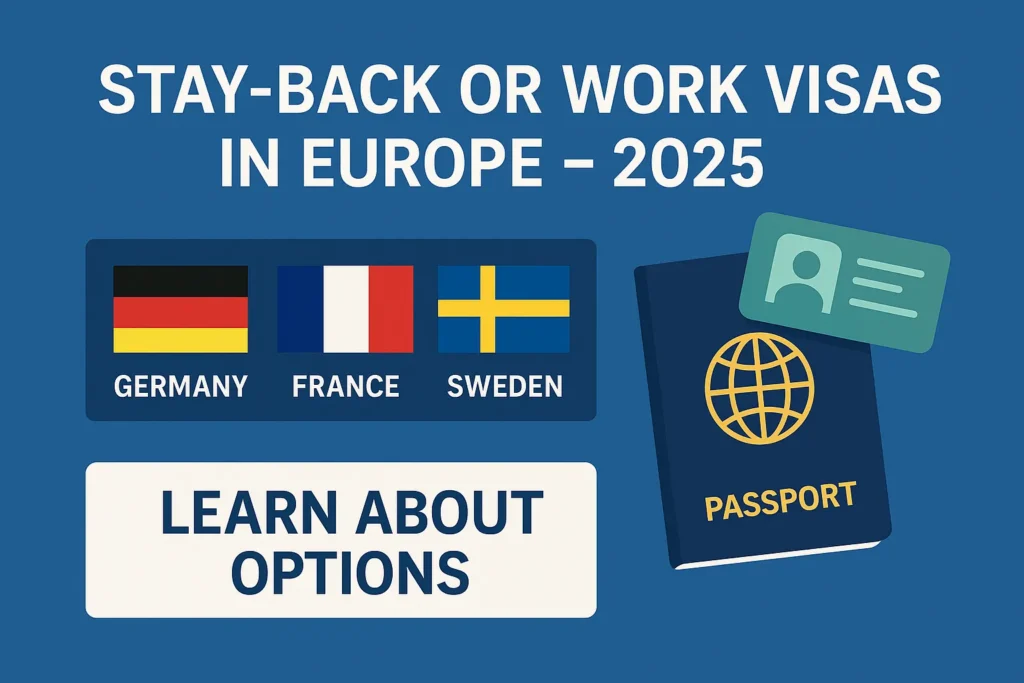After completing your studies in Europe, many students want to stay and work. Luckily, countries like Germany, France, and Sweden offer legal pathways to stay after graduation. This article explains the stay-back or work visa options available in these countries, eligibility rules, application process, and important tips for international graduates in 2025.

What Is a Stay-Back or Post-Study Work Visa?
A stay-back visa or post-study work permit allows you to legally stay in the country after your graduation — usually to find a job, work full-time, or apply for a work visa. It helps international students build careers abroad without needing to return home immediately.
Stay-Back Options in Germany, France, and Sweden
| Country | Stay-Back Duration | Work Allowed | Visa Type / Pathway |
|---|---|---|---|
| Germany | 18 months | Full-time | Job-Seeking Visa |
| France | 12–24 months | Full-time | Temporary Residence Permit (APS) |
| Sweden | 12 months | Full-time | Residence Permit for Job Seekers |
🇩🇪 Germany: Job-Seeking Visa After Graduation
Eligibility:
- Completed a degree from a German university
- Valid residence permit as a student
- Proof of sufficient funds (approx. €947/month)
Benefits:
- Stay up to 18 months after graduation
- Can work full-time during this period
- Apply for EU Blue Card or work permit after getting a job
Documents Needed:
- Valid passport
- University graduation certificate
- Health insurance
- Proof of finances (e.g., blocked account, bank statement)
- Rental agreement (proof of address)
Where to Apply:
- Apply at your local Ausländerbehörde (Foreigners’ Office) before your student visa expires
🇫🇷 France: APS (Temporary Resident Permit)
Eligibility:
- Completed a Master’s degree (or higher) from a French institution
- Non-EU/EEA student
- Valid student residence permit
Duration:
- 12 months (can be extended once)
- Students with “Titre de séjour” can apply for APS
Work Allowed:
- Full-time work
- No job offer required at time of application
How to Apply:
- Apply at your local prefecture or online
- Submit proof of graduation, valid passport, health insurance, and financial proof (~€615/month)
🇸🇪 Sweden: Job-Seeking Residence Permit
Eligibility:
- Completed full-time studies of at least two semesters in Sweden
- Non-EU/EEA student
- Valid student permit during graduation
Duration:
- 12 months stay-back period
Conditions:
- You can stay and search for jobs or start your own business
- Once you find a job, you can apply for a Swedish work permit
Application Steps:
- Apply online at Migrationsverket.se
- Submit degree certificate, passport, bank statement (SEK 9,450/month)
- Wait for approval before your student permit expires
What Happens After You Get a Job?
Once you find a full-time job related to your field, you can:
- Apply for a long-term work visa
- Apply for an EU Blue Card if your salary meets the threshold
- Eventually apply for Permanent Residency (PR) after working for several years
EU Blue Card – For Skilled Workers
- Available in Germany, France, Sweden
- You must have a university degree + job offer
- Minimum salary requirement (varies by country)
- Valid for up to 4 years, renewable
Advantages:
- Faster PR route
- Can move within EU countries after some time
Tips for Getting a Job After Graduation
- Start applying during your final semester
- Attend university career fairs
- Update your LinkedIn and CV
- Learn local language (helps in France/Germany/Sweden)
- Apply for internships or trainee roles
What If You Don’t Get a Job in Time?
If you can’t secure a job during the stay-back period:
- You must leave the country before the visa expires
- Some countries allow re-applying later if you get a new job offer
- You may also apply for other visa types (e.g., startup, researcher, language learning)
Final Advice
Europe offers generous post-study work options to international graduates, especially in countries like Germany, France, and Sweden. Plan your job search early, apply for the stay-back visa before your student permit expires, and keep your documents ready.
Building your career in Europe is not just a dream — it’s a reality for thousands of international students every year.